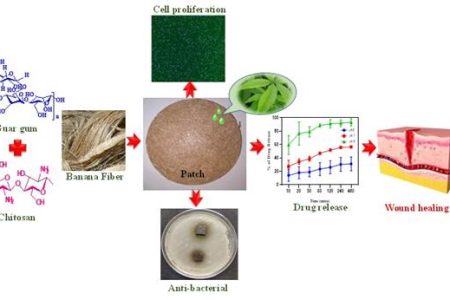New Delhi: In a remarkable stride towards sustainable wound care solutions, scientists at the Institute of Advanced Study in Science and Technology (IASST), an autonomous institute under the Department of Science and Technology, have developed an eco-friendly wound dressing material using banana fibers.
India, being the world’s largest banana-farming country, grapples with a surplus of banana pseudo stems discarded after harvest. In a pioneering effort led by Prof. Devasish Chowdhury and Prof. (Retd) Rajlakshmi Devi, the research team ingeniously transformed these pseudo stems, typically considered agricultural waste, into an innovative wound dressing material.
The process involved combining banana fibers with biopolymers like chitosan and guar gum, resulting in a multifunctional patch boasting excellent mechanical strength and antioxidant properties. Taking the innovation a step further, the researchers loaded the patch with an extract from the Vitex negundo L. plant, showcasing its potential as an in vitro drug release and antibacterial agent.
Importantly, all materials used in creating this groundbreaking dressing are natural and locally available, ensuring a simple, cost-effective, and non-toxic manufacturing process. The banana fiber-biopolymer composite dressing not only provides a sustainable solution for wound care but also opens new avenues for utilizing the abundant banana plant, offering potential benefits to farmers and minimizing environmental impact.
Prof. Devasish Chowdhury stated, “This investigation opens the door to a new era in wound healing, offering a low-cost, reliable, and environmentally friendly alternative that holds significant potential in biomedical research.” The potential broad applications of this dressing material could revolutionize wound care, making a positive impact on both health and the environment.
Elsevier recently published this groundbreaking research in the International Journal of Biological Macromolecules, further underlining its significance in the scientific community. The banana fiber-based wound dressing stands as a testament to the power of innovative, sustainable solutions emerging from the intersection of agriculture, biotechnology, and healthcare.

